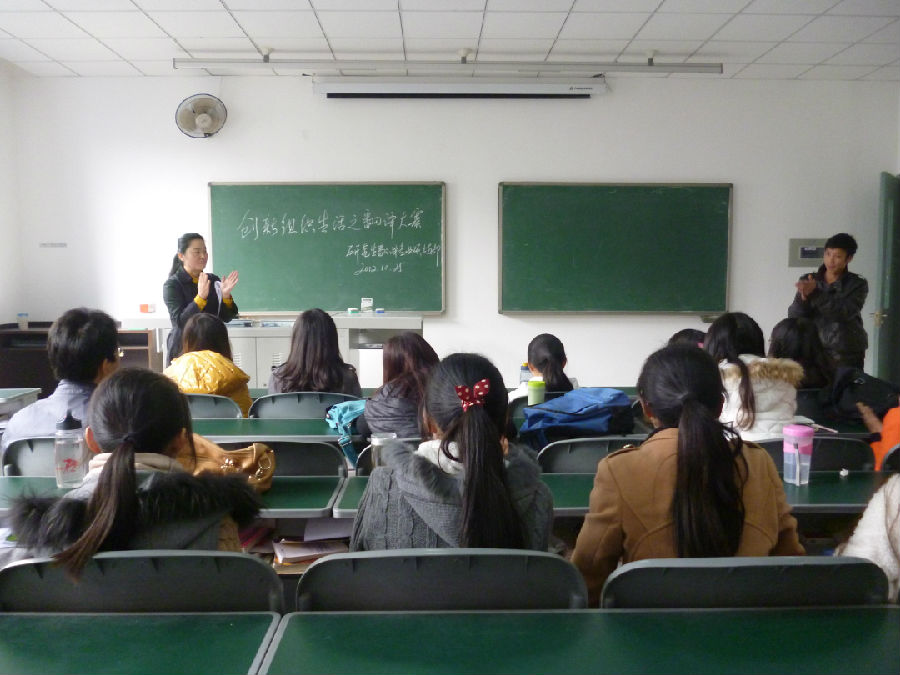 返回
教育头条
返回
教育头条

翻译是考研英语中比较难的一部分
翻译是考研英语中比较难的一部分,翻译不仅要求要读懂大意,还要准确地理解每个单词和每个细微之处。此外,还需要良好的中文表达,将自己对英文的理解流畅通顺地表达出来。因此对于考研英语的翻译,看懂了不一定是真的理解了,理解了不一定能表达好。翻译一定要勤加练习,落实到笔头上。
原文首段
① Do animals have rights ② This is how the question is usually put. ③ It sounds like a useful, ground-clearing way to start. ④Actually, it isn’t, because it assumes that there is an agreed account of human rights, which is something the world does not have.
详细解析
① Do animal shave rights ② This is how the question is usually put. ③ It sounds like a useful, ground-clearing way to start.
词
put这里意为“提出”,宾语通常是问题、建议等。
ground-clearing是一个复合词,相当于动词词组clear the ground for …,意为“为…扫清障碍,铺平道路”,因此形容词ground-clearing译为“开创性的,新颖的”。
句
第二句话中的how引导的是表语从句,this就是指首句话,第三句中的it就是前面的the question,句末的to start是不定式作后置定语修饰way。
译
动物拥有权利吗?这个问题通常就是这样提出来的。它听起来似乎是一个实用且新颖的开始方式。
④ Actually, it isn’t, because it assumes that there is an agreed account of human rights, which is something the world does not have.
词
assume /sjum/是常见动词,译为“假定,假设”。
agreed /ɡrid/是形容词,意为“商定的,一致同意的”。
account /kant/是名词,意为“解释,说明”,常用an account of sth。
human rights 意为“”,这个词常用复数的形式。
句
本句中的两个it都是指前文中的the question,这句话的主干是it isn’t,其实后面省略了a useful, ground-clearingway to start。
动词assume后面是that宾语从句,逗号后的which是引导定语从句,这个从句修饰的是account,如果修饰的是human rights,那么从句的谓语应该是are。
在which定语从句中包含一个定语从句the world does not have修饰something,省略了关系代词that。
译
实际上,它并不是,因为它假设对有一种一致的解释,但是世界上却没有这种说法。
原文第二段
① On one view of rights, to be sure, it necessarily follows that animals have none. ②Some philosophers argue that rights exist only within a social contract, as part of an exchange of duties and entitlements.③ Therefore, animals cannot have rights. ④ The idea of punishing a tiger that kills somebody is absurd, for exactly the same reason, so is the idea that tigers have rights. ⑤ However, this is only one account, and by no means an uncontested one. ⑥ It denies rights not only to animals but also to some people — for instance, to infants, the mentally incapable and future generations. ⑦ In addition, it is unclear what force a contract can have for people who never consented to it: how do you reply to somebody who says “I don’t like this contract”
详细解析
① On oneview of rights, to be sure, it necessarily follows that animals have none.
词
view /vju/是名词,意为“思考或理解的方式”,英文释义为a way of thinking about or understanding something。
to be sure是副词短语,意为“诚然,不能否定”。
necessarily /nessrli,nesserli/是副词,意为“必然地,不可避免地”。
follow是常见词,这里意为“是…的结果,由此得出”。
译
不可否认,其中有一种权利观它一定认为动物没有任何权利。
② Some philosophers argue that rights exist only within a social contract, as part of an exchange of duties and entitlements. ③ Therefore, animals cannot have rights.
词
contract /kntrkt/这里作名词,意为“契约,合约”。
duty /djuti/是名词,意为“义务,责任”。
entitlement /ntatlmnt/是名词,指拥有某事物的“权利,资格”。
句
第二句话的谓语argue跟了一个宾语从句,句末的as译为“作为”,它引导的是一个主语补足语,补充说明主语rights。
译
一些哲学家认为,权利只存在于社会契约中,作为责任与权利交换的一部分。因此,动物不可能有权利。
④ The idea of punishing a tiger that kills somebody is absurd, for exactly the same reason, so is the idea that tigers have rights.
词
absurd /bsd/是形容词,意为“荒谬的,荒唐的”。
exactly /ɡzktli/是副词,这里用于强调,意为“恰好,正好”,同义词是precisely。
句
这句话是个并列句,前半句中that kills somebody是定语从句,修饰a tiger。后半句是一个完全倒装句,句末that引导的是同位语从句,说明idea的具体内容。
译
惩罚一只吃了人的老虎,这种观点很荒唐,正是因为同样的原因,所以老虎拥有权利的观点也是荒谬的。
⑤ However, this is only one account, and by no means an uncontested one.
词
account与首段第四句中的是同样的意思“解释,说法”。
by no means 是固定短语,意为“绝不,一点都不”。
uncontested /nkntestd/是形容词,意为“没有争议的,无人反对的”。
译
然而,这只是一种说法,而且这种说法绝非毫无争议。
⑥ It denies rights not only to animals but also to some people — for instance, to infants, the mentally incapable and future generations.
词
deny /dna/是动词,意为“否认,否定”,此处使用了另外一个意思,“拒绝给予某人某物,不允许某人拥有某物”,常用双宾语结构deny sb sth或者deny sth to sb,明显这里用的是第二种。
infant /nfnt/是名词,意为“婴儿,幼儿”,这个词还可作形容词,意为“初期的,初创的”,这个意思也很常见。
incapable是形容词,意为“无能力的,不会的”。
句
本句的it指的是前面的“动物没有权利这种说法”,句中还使用了not only… but also…结构,破折号后面很明显是举例说明some people,句末的the mentallyincapable and future generations是infants的同位语,是对infants更加具体的说明。

译
它不仅否认动物的权利,而且还否认某些人的权利,例如婴儿,他们是心智尚未发育完全的下一代。
⑦ In addition, it is unclear what force a contract can have for people who never consented to it: how do you reply to somebody who says “I don’t like this contract”
词
in addition是常见的短语,意为“此外,除此之外”。
force/fs/这里作名词,意为“影响力,威力”。
consent /knsent/是不及物动词,意为“同意,允许”,后面要跟介词to。
reply /rpla/作动词,意为“回复,答复”,回答某人用reply to sb。
句
这句话的主干是it is unclear,其中it是形式主语,真正的主语是后面what引导的主语从句,而从句中还包含一个who引导的定语从句修饰people。
冒号后面完整的一句话,作为补充,其中somebody后面跟的是who引导的定语从句,从句谓语says后面接的是宾语从句。
译
此外,对于一直都不同意契约的人,契约对他们有什么影响尚不清楚:对于说“我不喜欢这份契约”的人,你怎样回答他们呢?
完整译文
一段
① 动物拥有权利吗?②这个问题通常就是这样提出来的。③它听起来似乎是一个实用且新颖的开始方式。④实际上,它并不是,因为它假设对有一种一致的解释,但是世界上却没有这种说法。
第二段
① 不可否认,其中有一种权利观它一定认为动物没有任何权利。②一些哲学家认为,权利只存在于社会契约中,作为责任与权利交换的一部分。③因此,动物不可能有权利。④惩罚一只吃了人的老虎,这种观点很荒唐,正是因为同样的原因,所以老虎拥有权利的观点也是荒谬的。⑤然而,这只是一种说法,而且这种说法绝非毫无争议。⑥它不仅否认动物的权利,而且还否认某些人的权利,例如婴儿,他们是心智尚未发育完全的下一代。⑦此外,对于一直都不同意契约的人,契约对他们有什么影响尚不清楚:对于说“我不喜欢这份契约”的人,你怎样回答他们呢?
原文首段
① Do animals have rights ② This is how the question is usually put. ③ It sounds like a useful, ground-clearing way to start. ④Actually, it isn’t, because it assumes that there is an agreed account of human rights, which is something the world does not have.
详细解析
① Do animal shave rights ② This is how the question is usually put. ③ It sounds like a useful, ground-clearing way to start.
词
put这里意为“提出”,宾语通常是问题、建议等。
ground-clearing是一个复合词,相当于动词词组clear the ground for …,意为“为…扫清障碍,铺平道路”,因此形容词ground-clearing译为“开创性的,新颖的”。
句
第二句话中的how引导的是表语从句,this就是指首句话,第三句中的it就是前面的the question,句末的to start是不定式作后置定语修饰way。
译
动物拥有权利吗?这个问题通常就是这样提出来的。它听起来似乎是一个实用且新颖的开始方式。
④ Actually, it isn’t, because it assumes that there is an agreed account of human rights, which is something the world does not have.
词
assume /sjum/是常见动词,译为“假定,假设”。
agreed /ɡrid/是形容词,意为“商定的,一致同意的”。
account /kant/是名词,意为“解释,说明”,常用an account of sth。
human rights 意为“”,这个词常用复数的形式。
句
本句中的两个it都是指前文中的the question,这句话的主干是it isn’t,其实后面省略了a useful, ground-clearingway to start。
动词assume后面是that宾语从句,逗号后的which是引导定语从句,这个从句修饰的是account,如果修饰的是human rights,那么从句的谓语应该是are。
在which定语从句中包含一个定语从句the world does not have修饰something,省略了关系代词that。
译
实际上,它并不是,因为它假设对有一种一致的解释,但是世界上却没有这种说法。
原文第二段
① On one view of rights, to be sure, it necessarily follows that animals have none. ②Some philosophers argue that rights exist only within a social contract, as part of an exchange of duties and entitlements.③ Therefore, animals cannot have rights. ④ The idea of punishing a tiger that kills somebody is absurd, for exactly the same reason, so is the idea that tigers have rights. ⑤ However, this is only one account, and by no means an uncontested one. ⑥ It denies rights not only to animals but also to some people — for instance, to infants, the mentally incapable and future generations. ⑦ In addition, it is unclear what force a contract can have for people who never consented to it: how do you reply to somebody who says “I don’t like this contract”
详细解析
① On oneview of rights, to be sure, it necessarily follows that animals have none.
词
view /vju/是名词,意为“思考或理解的方式”,英文释义为a way of thinking about or understanding something。
to be sure是副词短语,意为“诚然,不能否定”。
necessarily /nessrli,nesserli/是副词,意为“必然地,不可避免地”。
follow是常见词,这里意为“是…的结果,由此得出”。
译
不可否认,其中有一种权利观它一定认为动物没有任何权利。
② Some philosophers argue that rights exist only within a social contract, as part of an exchange of duties and entitlements. ③ Therefore, animals cannot have rights.
词
contract /kntrkt/这里作名词,意为“契约,合约”。
duty /djuti/是名词,意为“义务,责任”。
entitlement /ntatlmnt/是名词,指拥有某事物的“权利,资格”。
句
第二句话的谓语argue跟了一个宾语从句,句末的as译为“作为”,它引导的是一个主语补足语,补充说明主语rights。
译
一些哲学家认为,权利只存在于社会契约中,作为责任与权利交换的一部分。因此,动物不可能有权利。
④ The idea of punishing a tiger that kills somebody is absurd, for exactly the same reason, so is the idea that tigers have rights.
词
absurd /bsd/是形容词,意为“荒谬的,荒唐的”。
exactly /ɡzktli/是副词,这里用于强调,意为“恰好,正好”,同义词是precisely。
句
这句话是个并列句,前半句中that kills somebody是定语从句,修饰a tiger。后半句是一个完全倒装句,句末that引导的是同位语从句,说明idea的具体内容。
译
惩罚一只吃了人的老虎,这种观点很荒唐,正是因为同样的原因,所以老虎拥有权利的观点也是荒谬的。
⑤ However, this is only one account, and by no means an uncontested one.
词
account与首段第四句中的是同样的意思“解释,说法”。
by no means 是固定短语,意为“绝不,一点都不”。
uncontested /nkntestd/是形容词,意为“没有争议的,无人反对的”。
译
然而,这只是一种说法,而且这种说法绝非毫无争议。
⑥ It denies rights not only to animals but also to some people — for instance, to infants, the mentally incapable and future generations.
词
deny /dna/是动词,意为“否认,否定”,此处使用了另外一个意思,“拒绝给予某人某物,不允许某人拥有某物”,常用双宾语结构deny sb sth或者deny sth to sb,明显这里用的是第二种。
infant /nfnt/是名词,意为“婴儿,幼儿”,这个词还可作形容词,意为“初期的,初创的”,这个意思也很常见。
incapable是形容词,意为“无能力的,不会的”。
句
本句的it指的是前面的“动物没有权利这种说法”,句中还使用了not only… but also…结构,破折号后面很明显是举例说明some people,句末的the mentallyincapable and future generations是infants的同位语,是对infants更加具体的说明。

译
它不仅否认动物的权利,而且还否认某些人的权利,例如婴儿,他们是心智尚未发育完全的下一代。
⑦ In addition, it is unclear what force a contract can have for people who never consented to it: how do you reply to somebody who says “I don’t like this contract”
词
in addition是常见的短语,意为“此外,除此之外”。
force/fs/这里作名词,意为“影响力,威力”。
consent /knsent/是不及物动词,意为“同意,允许”,后面要跟介词to。
reply /rpla/作动词,意为“回复,答复”,回答某人用reply to sb。
句
这句话的主干是it is unclear,其中it是形式主语,真正的主语是后面what引导的主语从句,而从句中还包含一个who引导的定语从句修饰people。
冒号后面完整的一句话,作为补充,其中somebody后面跟的是who引导的定语从句,从句谓语says后面接的是宾语从句。
译
此外,对于一直都不同意契约的人,契约对他们有什么影响尚不清楚:对于说“我不喜欢这份契约”的人,你怎样回答他们呢?
完整译文
一段
① 动物拥有权利吗?②这个问题通常就是这样提出来的。③它听起来似乎是一个实用且新颖的开始方式。④实际上,它并不是,因为它假设对有一种一致的解释,但是世界上却没有这种说法。
第二段
① 不可否认,其中有一种权利观它一定认为动物没有任何权利。②一些哲学家认为,权利只存在于社会契约中,作为责任与权利交换的一部分。③因此,动物不可能有权利。④惩罚一只吃了人的老虎,这种观点很荒唐,正是因为同样的原因,所以老虎拥有权利的观点也是荒谬的。⑤然而,这只是一种说法,而且这种说法绝非毫无争议。⑥它不仅否认动物的权利,而且还否认某些人的权利,例如婴儿,他们是心智尚未发育完全的下一代。⑦此外,对于一直都不同意契约的人,契约对他们有什么影响尚不清楚:对于说“我不喜欢这份契约”的人,你怎样回答他们呢?
翻译是考研英语中比较难的一部分,如果你喜欢这篇文章,请将其保留版权转载。我的微信号(18560125702)欢迎来咨询,10年教培行业工作经验,如果你在考研方面有疑问,请与我联系,我将为您提供全面专业的选课帮助。返回教育宝头条
【免责声明】本文仅代表作者本人观点,与教育宝无关。教育宝对文中陈述、观点判断保持中立,不对所包含内容的准确性、可靠性或完整性提供任何保证。请读者仅作参考,特此声明!





